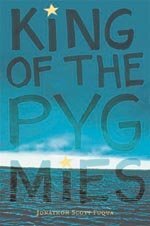
The latest crop of novels for high schoolers takes seriously the idea that teenagers mature in unseen ways: They carry big secrets, big emotions, big ideas, big fears—and the capacity to handle them all. Fifteen-year-old Penn is afraid he’s going crazy because he’s started hearing other people’s thoughts. King of the Pygmies (Candlewick), by Jonathon Scott Fuqua, is about how he deals with the specter of mental illness and an alternate explanation offered by his uncle. When Luz’s adored older brother is killed, she becomes crazy with rage, directing it toward the cop who confronted her brother. But a stint at a group home and the journal she keeps there, chronicled in Antonio Pagliarulo’s A Different Kind of Heat (Delacorte), helps the teenager acknowledge her brother’s role in his demise.
Graham Sinclair is only 14, but his secret is too big to hide. In The Wrong Hands (Knopf), by Nigel Richardson, his large palms and webbed fingers make him feel monstrous until he embraces their power and the heights to which they can take him. Secrets are also shared in Invisible Threads (Delacorte), written by Annie Dalton and her adopted daughter, Maria Dalton. Alternating chapters recount the parallel stories of 16-year-old Naomi, who gave up her child, and Carrie-Anne, who at the same age is proud not to have gotten pregnant and convinced she won’t know herself unless she finds her birth mother.

Sebastian, the 18-year-old protagonist in Joaquin Dorfman’s Playing It Cool (Random House), isn’t adopted, but he’s never known his father. The go-to guy when anyone needs a favor, he creates an intricate scheme to reunite a friend with his own dad, which seems to succeed until Sebastian gets too emotionally involved. California high school senior Emily finds her beliefs challenged by a charismatic new teacher inPeace Is a Four-Letter Word (Heyday), by Janet Nichols Lynch. In 1990, on the eve of the first Gulf conflict, Emily’s comfortable life—cheerleader, top student, steady boyfriend—is disrupted by her intensifying anti-war stance and the family’s troubled orange grove business, making her reassess what she really wants.
In Nick and Norah’s Infinite Playlist (Knopf)—another two-voice story, this one set in New York City’s all-night music scene and written by Rachel Cohn and David Levithan—the heartsick teens of the title both think they know exactly what they want: someone else. But a reluctant five-minute partnership makes them realize that maybe all they really need is each other. The needs of 17th century Italian teenager Angelica Voglia aren’t so simple: After Pope Innocent XI forbids women to sing in public, she can only practice her music behind convent walls. Or she can try to join the court of Queen Christina, known for flouting the ever-stricter church’s proclamations. Carol Dines’ The Queen’s Soprano (Harcourt) is based on a true story and relates the politics, betrayals, and romances of that time.


